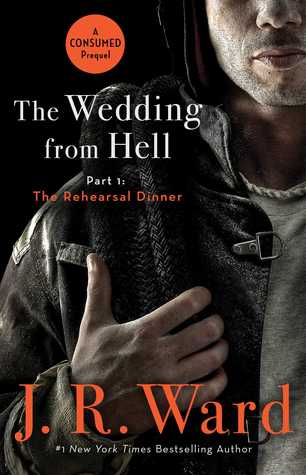 The Rehearsal Dinner (The Wedding From Hell #1) by J.R. Ward
The Rehearsal Dinner (The Wedding From Hell #1) by J.R. Ward Formats available: ebook
Series: Firefighters #0.5
Pages: 63
Published by Gallery Books on July 17, 2018
Purchasing Info: Author's Website, Publisher's Website, Amazon, Barnes & Noble, Kobo
Goodreads
Don’t miss #1 New York Times bestselling author J.R. Ward’s three-part ebook serialization: The Wedding From Hell. This exclusive prequel to her upcoming standalone suspense Consumed (available in October 2018) takes us back to where it all started between arson investigator Anne Ashburn and ‘bad boy’ firefighter Danny Maguire. The Wedding From Hell is a sexy standalone novella that sets up Consumed’s storyline, leaving fans hungry for more and dying to snatch it up.
The Wedding From Hell, Part 1: The Rehearsal Dinner: It’s a classic recipe for disaster: Take one bridesmaid who thinks pink is the root of all evil, mix with a best man who’s hotter than a four-alarm fire, add in their explosive sexual attraction, a nightmare bridezilla, two cat fights, and an emergency call, and you have the wedding from hell.
Experience the sizzling start of Anne and Danny’s intense relationship. Is this the start of something good...or just an erotic one-night stand that rocks their world, but must never be repeated?
My Review:
Because this is a short teaser of a book, it’s going to be a short teaser of a review, too.
I got into this tour, and the prequel novellas, because my curiosity bump itched something fierce. I loved Black Dagger Brotherhood way back when, although I didn’t finish the series because they started to get a repetitive for me. But I enjoyed the hell out of the early books in the series.
Howsomever, I DNF’d The Bourbon Kings at about the halfway point. The only reason I didn’t throw it against the wall was that my iPad is WAY too expensive to throw at walls. But I was still tempted.
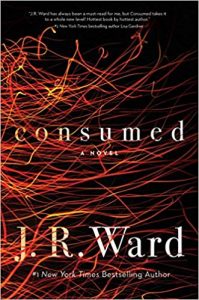 When I saw the info for The Wedding from Hell introductory novellas along with the blurb for the full-length Consumed, I decided to give this author another try.
When I saw the info for The Wedding from Hell introductory novellas along with the blurb for the full-length Consumed, I decided to give this author another try.
And so far, I’m glad I did.
The Wedding from Hell, at least so far, combines some really terrific tropes. The romance, or at least the steamy and unresolved chemistry so far, is between two members of a small-town New England fire department. She’s the daughter of a local legend and the sister of a current commander. He’s the company man-whore. Or at least he used to be.
They work well together, seemingly able to sense what the other is thinking, and always managing to be in the right place at the right time with the right equipment.
But this assignment isn’t work. Not exactly.
A member of their company is getting married and he wants all of the “guys” from his station house to be his groomsmen. Including Anne Ashburn. That she’s not a guy pisses the bridezilla right off – not that that takes much. But Danny McGuire, the best man and Anne’s work-partner, knows that bridezilla should not be marrying one of his best friends. He won’t let Anne out of the wedding, because he needs the moral support.
And because he hasn’t been able to get Anne out of his head or his heart since the day she walked into the station. He’s got it really, really bad.
But no matter how much Anne is interested in him, she’s not interested in being another notch on his bedpost – especially once she figures out that bridezilla got there first.
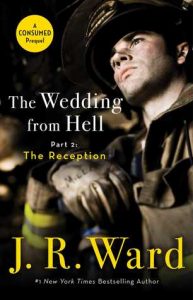 Escape Rating B+: As a FREE teaser novella, this certainly does its job. I definitely feel teased, although I admit not nearly as teased as Ann and Danny are by each other.
Escape Rating B+: As a FREE teaser novella, this certainly does its job. I definitely feel teased, although I admit not nearly as teased as Ann and Danny are by each other.
I enjoy a good firefighter romance, I love to see the rake get reformed, and the wedding so far as produced oodles of cringeworthy scenes of epic bridezilla-dom, injecting just the right touch of sheer insanity into the story.
As short as this story is, we still get a good introduction to Anne and Danny and at least some of their crew. More than enough to want to find out just how long they manage to resist each other – and whether anyone else in the crew is running a betting pool on it.
I can wait to get to the next installment of The Wedding from Hell, The Reception.
Excerpt from The Wedding from Hell: The Rehearsal Dinner
Thursday, October 29
T minus 48 hours ’til blastoff
College Row, New Brunswick, MassachusettsBecause women are not frickin’ groomsmen! That’s why she can’t be in the goddamn wedding!”
As Anne Ashburn walked in the back door of the shotgun apartment, that happy little explosion was not only what she’d expected all along, it also offered her the out she’d been praying for. And it was probably the one and only time she was ever going to agree with the bride.
Not about the role of females in bridal parties, but that Anne wasn’t going to be in the “goddamn wedding.”
Everyone standing in the kitchen turned and looked at her: Deandra Cox, the impending wearer of the white dress; Robert “Moose” Miller, her exhausted fiancé and Anne’s fellow crew member down at the 499 fi rehouse; and . . . Dannyboy Maguire.
Who was the only one she really noticed and, for that reason, the person she refused to look at.
Too bad Danny always made an impression. Like most firefighters, he was in great physical shape, his big body thickly muscled and ready to snap into motion in an instant. With his heavy arms linked over that chest and his long legs crossed at the boots, he was leaning back against the chipped countertop, his too-blue stare missing nothing. He was fresh from a shower, his glossy black hair wet, and Anne tried not to picture him naked under the spray, his tattooed torso arching as he rinsed the shampoo out of his—
She put her hands up to stop herself as much as the argument. “Look, I don’t want to cause any problems. I’m happy to step aside—”
“And now I have one too many bridesmaids.” The bride-to-be refocused on her intended. “My count is wrong. You wait until two days before the wedding to tell me this when you know I’m not going to like it, and now my count is off!”
As the groom focused on the linoleum floor, it was impossible not to picture a wax version of the couple on a multi-tiered cake: Deandra in skinny jeans and that tight cashmere sweater, her dark hair streaked blond, her body cocked forward like she was going to throat-punch the man she was going to marry; Moose in his New Brunswick Fire Department T-shirt, all broad-shouldered and bearded around the face, easing back like someone with the flu was about to sneeze in his face.
Ah, true love.
“I didn’t think it was a big deal,” Moose muttered. “Anne’s a member of the four-nine-nine crew, and everyone else is with me.”
“She’s a girl.” Deandra pointed at Anne. “It throws off everything.”
“I really don’t want to cause any problems.” Anne put her hands up again. “So I’ll just be in the congregation. It’s perfectly fine—”
Deandra’s glare swung Anne’s way. “The count is still wrong. And my friends have already paid for their dresses. They were a hundred and twenty dollars apiece.”
And that’s my cue to go, Anne thought. Moose may have volunteered for this, but no one else had or needed to—
“I think women can be whatever they want.”
As Danny spoke up, everyone looked at him—including Anne, who suddenly felt shades of what Deandra was throwing out.
Don’t you dare, she mouthed at him behind the bride’s back.
Danny just shrugged like he’d thrown on a pantsuit and was channeling Oprah, Michelle Obama, and Hillary Clinton all at once. “I mean, Deandra, you’re above all that sexism, aren’t you? No one’s going to tell you what’s right and wrong for your own wedding. You’re more secure than that.”
I am going to kill you, Anne vowed. “I think Deandra wants things done properly for her only wedding.”
Danny frowned in pseudo-confusion. “So you’re saying it’s okay to have a double standard for men and women? That’s a shocker given how you are at the station. I thought you believed in equality.”
“I do,” Anne snapped. “But this isn’t about equality.”
“You sure? I don’t know how you can support traditional gender roles when it comes to a wedding ceremony at the same time you defend the right for women to be firefighters, cops, and on the front lines in the military.”
“Spare me someone who’s never been in a dress having an opinion about women’s issues, okay?”
“I’m just pointing out that you don’t want women out of dresses.”
“It’s her wedding.” Anne jabbed a finger at Deandra. “She’s the bride. She gets to say what’s right and wrong for her, and she does not need some man telling her what to do.”
“Even if I’m defending the rights of women?”
“Until you grow a set of ovaries, you can shut the hell up about our rights!”
As Anne’s voice ricocheted around the kitchen, she realized that she’d marched right up to Danny—and that Deandra and Moose were watching the two of them in total stillness.
She cleared her throat and took a step back. “Anyway, Deandra’s made up her mind. And I support her decision.”
Deandra’s eyes narrowed on Danny, and something about the way the woman looked at him didn’t seem right.
“Actually,” the bride said, “maybe she should be in the wedding party.”
Anne prayed her expression stayed neutral. “Don’t compromise your vision on my account.”
“I won’t.” The woman stared at Danny. “Fine. Let’s put her in a tuxedo like the rest of the men. She can walk my sister down the aisle, just like a man should. Her shoulders are too big for a gown, anyway, and that way my count stays the way it should.”
Anne rolled her eyes. Let’s hear it for girl power.
“So it’s settled,” Deandra said with a tight smile. “You need a tux. Unless you already own one.”
For a moment, Anne waited for somebody to argue with the woman. Like Moose. But he was clearly done falling on swords over the wedding details, and Danny had just gotten what he wanted so he wasn’t going to say a damn thing.
And the truth was, after how many years of fighting fires with these men, they were her brothers in all but blood. Even though she thought Moose had lost his ever-loving mind marrying this beautiful but sour woman after knowing her for a matter of months, Anne was still going to stand up for the guy if he wanted her to—and he did. He’d asked her down at the stationhouse specifically.
“Where did you guys rent your suits?” Anne said to him.
“Tuxedoes,” Deandra corrected.
The groom blinked like he’d forgotten how to speak English. Then again, he’d been doing that a lot at the firehouse lately. “You’re actually going to wear one?”
“What the hell do I care?”
“Yes, she is wearing one,” Deandra cut in.
Danny spoke up. “I’ll go with you. I know where the place is.”

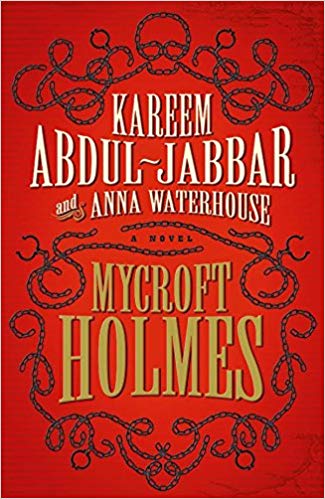 Mycroft Holmes by
Mycroft Holmes by 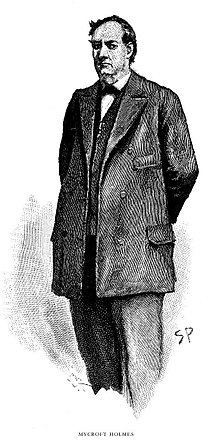
 (I have a picture in my head of Mycroft as he’s described in this book, and he looks a lot like Simon Ward as
(I have a picture in my head of Mycroft as he’s described in this book, and he looks a lot like Simon Ward as 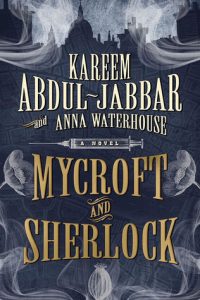 There’s a sequel coming out this fall. In fact, I was led to this book by a promo for the upcoming title,
There’s a sequel coming out this fall. In fact, I was led to this book by a promo for the upcoming title, 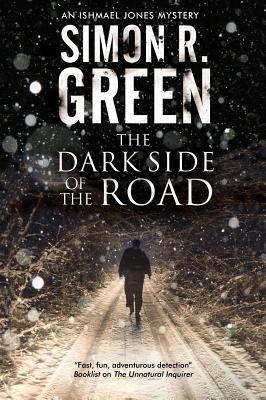 The Dark Side of the Road (Ishmael Jones, #1) by
The Dark Side of the Road (Ishmael Jones, #1) by 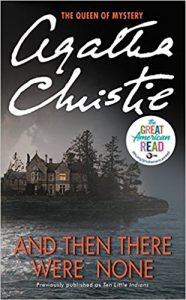 Along with a high creep factor – but one that is totally appropriate to its horror-adjacency.
Along with a high creep factor – but one that is totally appropriate to its horror-adjacency.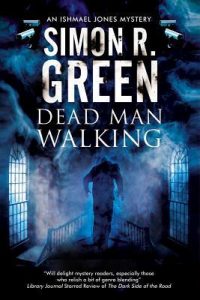 I liked being inside his head. Ishmael is an interesting and still somewhat enigmatic character. I’m looking forward to reading more of his adventures – the next time I need another compelling book and/or cure for a book hangover!
I liked being inside his head. Ishmael is an interesting and still somewhat enigmatic character. I’m looking forward to reading more of his adventures – the next time I need another compelling book and/or cure for a book hangover!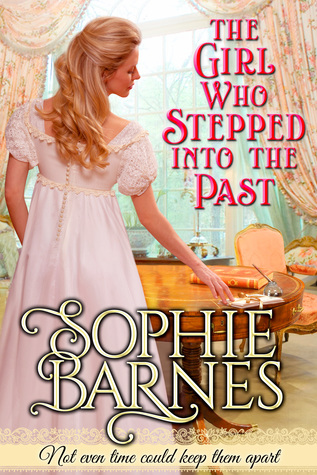 The Girl Who Stepped Into The Past by
The Girl Who Stepped Into The Past by 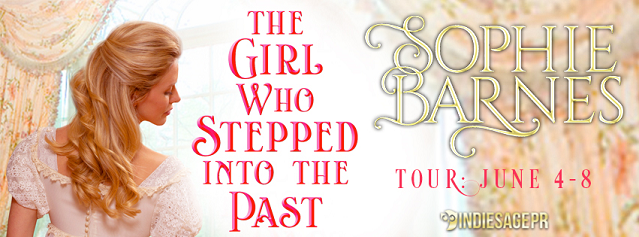
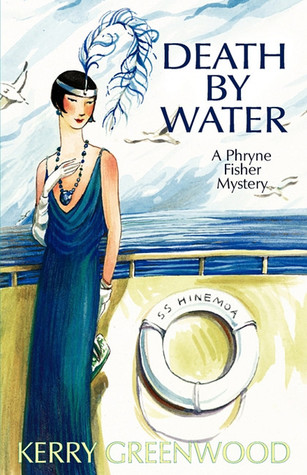 Death by Water (Phryne Fisher, #15) by
Death by Water (Phryne Fisher, #15) by 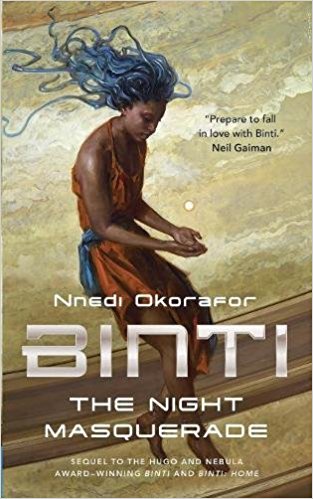 The Night Masquerade (Binti, #3) by
The Night Masquerade (Binti, #3) by 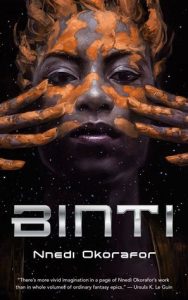 Admittedly, one reason why I hadn’t read The Night Masquerade already was because as much as I adored the first book,
Admittedly, one reason why I hadn’t read The Night Masquerade already was because as much as I adored the first book, 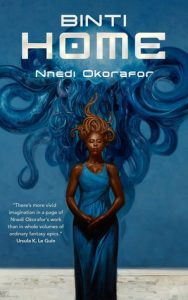 In Binti, we saw her first, sometimes tentative steps into the wider universe, not in spite of but because of the tragedy that she survives aboard Third Fish. In Home, Binti is searching for who she is now, trying to harmonize all of the various parts of herself that she has discovered or that she has absorbed. And she flails around a bit. (Don’t we all at 17?)
In Binti, we saw her first, sometimes tentative steps into the wider universe, not in spite of but because of the tragedy that she survives aboard Third Fish. In Home, Binti is searching for who she is now, trying to harmonize all of the various parts of herself that she has discovered or that she has absorbed. And she flails around a bit. (Don’t we all at 17?)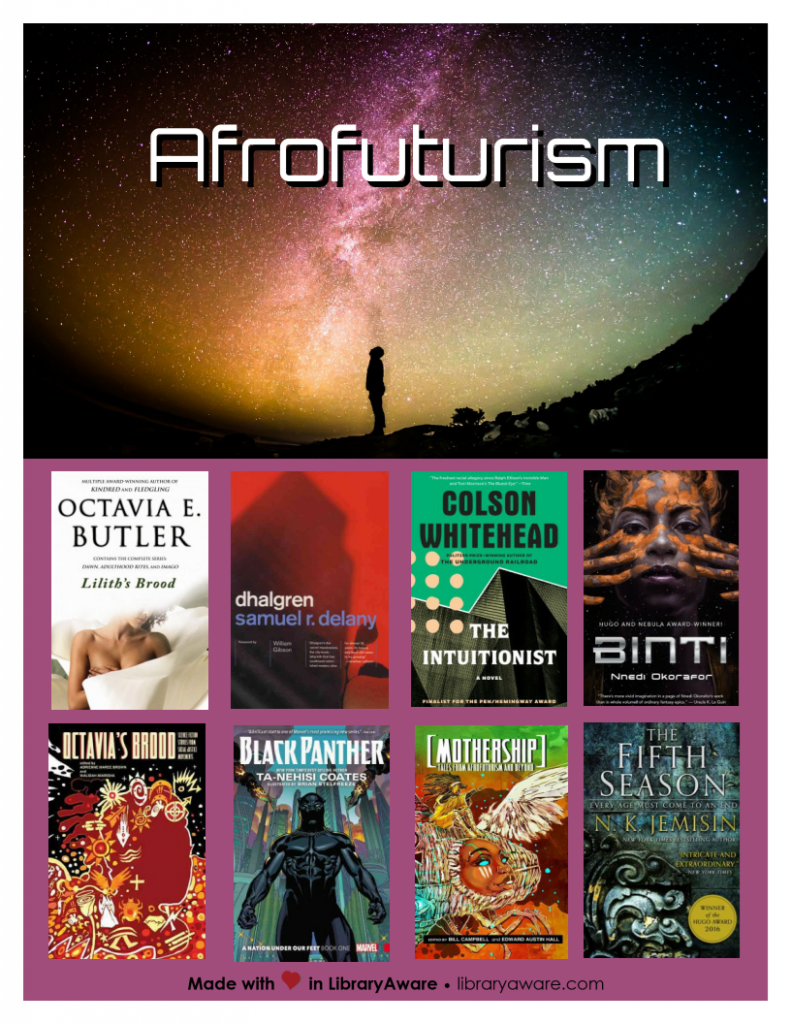
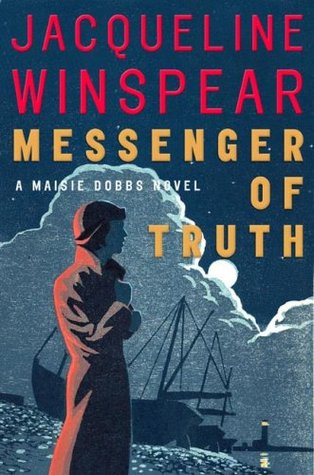 Messenger of Truth (Maisie Dobbs, #4) by
Messenger of Truth (Maisie Dobbs, #4) by 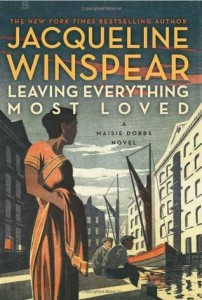 I always look forward to this tour, so I decided to do my own “Month of Maisie” this year. Hence today’s review of Messenger of Truth. Eventually I’ll catch up to myself, as I started reading with
I always look forward to this tour, so I decided to do my own “Month of Maisie” this year. Hence today’s review of Messenger of Truth. Eventually I’ll catch up to myself, as I started reading with 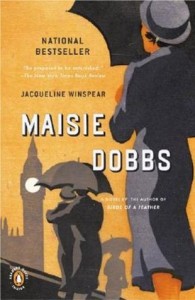 Escape Rating B+: This series as a whole are excellent historical mysteries. If you like the genre and haven’t read them yet, start with the first book,
Escape Rating B+: This series as a whole are excellent historical mysteries. If you like the genre and haven’t read them yet, start with the first book, 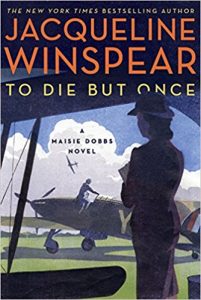 Maisie herself is always a fascinating character. Her life has made her the ultimate outsider, not part of any of the social classes, but able to operate in all of them. At the same time, this is a case where Maisie herself is working through multiple crossroads, deciding whether she wants a traditional life after all, or to continue down the independent road she has chosen. And just how much of her war it is time to put behind her – even as the next war looms on the horizon.
Maisie herself is always a fascinating character. Her life has made her the ultimate outsider, not part of any of the social classes, but able to operate in all of them. At the same time, this is a case where Maisie herself is working through multiple crossroads, deciding whether she wants a traditional life after all, or to continue down the independent road she has chosen. And just how much of her war it is time to put behind her – even as the next war looms on the horizon.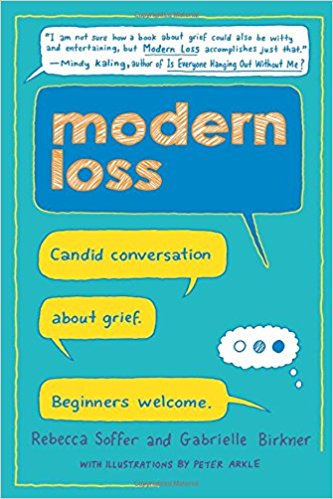 Modern Loss: Candid Conversation About Grief. Beginners Welcome. by
Modern Loss: Candid Conversation About Grief. Beginners Welcome. by 
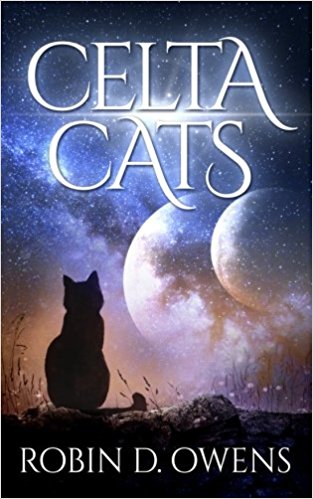 Celta Cats Formats available: paperback, ebook
Celta Cats Formats available: paperback, ebook 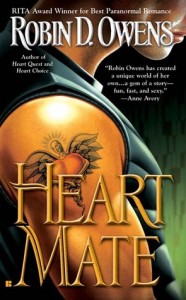
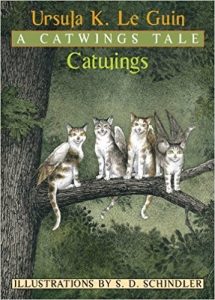 Reviewer’s Note: I read Celta Cats in the wake of Ursula K. LeGuin’s death. If you like the Celta Cats, you will love her
Reviewer’s Note: I read Celta Cats in the wake of Ursula K. LeGuin’s death. If you like the Celta Cats, you will love her 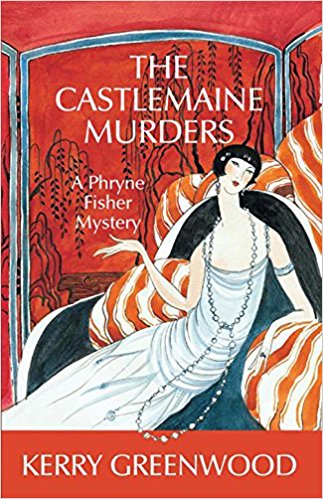 The Castlemaine Murders (Phryne Fisher, #13) by
The Castlemaine Murders (Phryne Fisher, #13) by 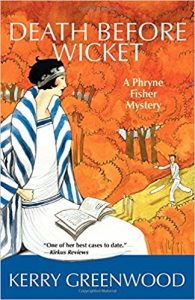 The Castlemaine Murders was one that tempted me a great deal. It had a lot of elements that made it just a bit different from previous books in the series, while, unlike
The Castlemaine Murders was one that tempted me a great deal. It had a lot of elements that made it just a bit different from previous books in the series, while, unlike 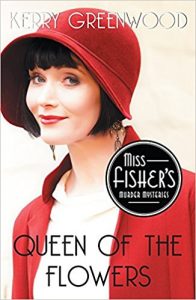 For those reading this book expecting it to be just like the TV show will probably be a bit disappointed, or even censorious about Phryne’s continued relationship with the married Lin Chung. But for those following the book series on its own merits, this one is a treat.
For those reading this book expecting it to be just like the TV show will probably be a bit disappointed, or even censorious about Phryne’s continued relationship with the married Lin Chung. But for those following the book series on its own merits, this one is a treat.